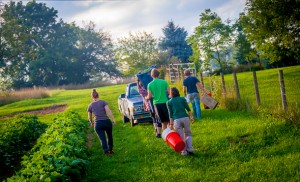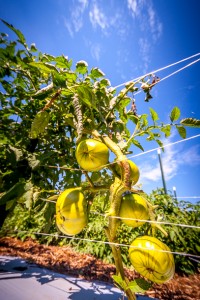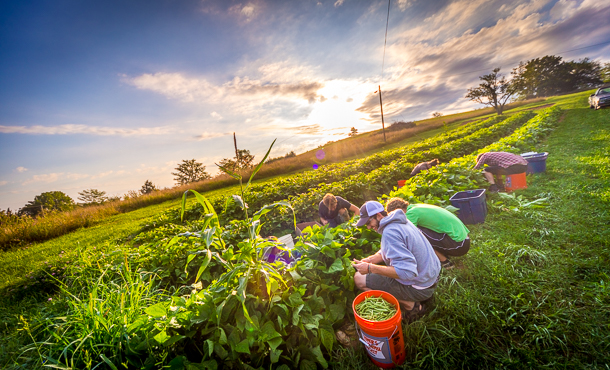When Tyler Eshleman took the helm of Eastern Mennonite University’s sputtering student-led Sustainable Food Initiative (SFI) last year, his goals were modest: to return the weed-choked campus gardens to their former glory. Now Eshleman, backed this summer by six work-study students, not only has the gardens brimming with produce, but has expanded SFI beyond campus borders, sharing the group’s mission with a variety of local schools and organizations, including Eastern Mennonite Elementary School and Virginia Mennonite Retirement Community’s Farm at Willow Run.
SFI, who seeks to expand local sustainability and social responsibility in food production, began in 2010 when a concerned group of students witnessed large amounts of unused cafeteria food being thrown away. This led to a food donation program, a campus composting program, the planting of campus vegetable gardens and even a student-run Community Supported Agriculture (CSA) program, which sold produce grown on campus to local buyers. However, when this core group of students graduated, SFI was left a ship with no captain, and its programs quickly fell into disarray.
Eshleman’s vision for the group focuses on longevity. “We are a student club,” the rising senior pointed out, “but have started to work towards being more of a coalition of local organizations and persons, to encourage better practices within our food systems, as well as helping groups fully utilize their own spaces to achieve healthier and more sustainable systems.”
Partnering on and off campus

One key to achieving this longevity is partnering with other campus organizations, such as Earthkeepers, the Creation Care Council and Engineers for a Sustainable World (ESW), to draw interest and forge common connections. Already this summer ESW helped the SFI crew install solar panels on the campus chicken shed to power the heat lamps that burn throughout the winter months.
“One of our visions for the next year is to share a meal made of locally grown food with as many campus groups as we can,” said Eshleman. “What better way to show people what we do, than through the food itself?”
The group also strives to promote EMU’s mission of sustainability outside solar arrays and LEED-certified buildings. “We want to live the way we talk,” said Malachi Bontrager, an outdoor ministries and adventure leadership major. “SFI is tangible and easy to access. We can fill a need and do so conscientiously.” Such an ethos demonstrates the group’s commitment to building sustainable local communities through dedicated service.
One of SFI’s key partnerships has been with the Farm at Willow Run. The farm, located on Willow Run Road just minutes from campus, is owned by the Virginia Mennonite Retirement Community (VMRC), and was once the property of former EMU president Myron Augsburger and his wife, Esther. Tom Brenneman, the market garden coordinator at VMRC, has been working with VMRC’s dining services director Tobie Bow on a farm-to-table renaissance with the help of SFI students.
Forging real connections

Brenneman, a 1992 graduate with a degree in social work, lives at Willow Run and manages the gardens, in addition to his work with court-involved youth in the 26th District court service unit in Harrisonburg. Despite the enormity of the Willow Run project, which is now delivering produce directly to VMRC kitchens from 1.5 acres of cultivated land, Brenneman laughed when thinking back to its humble beginnings.
“I just had all this extra produce,” he said, which he then passed along to his friend and “co-conspirator” Cal Redekop, who in turn shared the produce gratis with fellow residents in Park Village from a stand at the end of his driveway. The fresh produce has been a huge hit over the past four years. Soon a formal conversation began at the invitation of the executive team of VMRC about how local produce might be brought directly into dining services with sourcing from its own land and resources.
The Farm was quickly identified as a viable location, but who would do the work of growing it? Brenneman rallied volunteer support , some with the local (H)Oour Economy Time Banking network, which encourages community-building through creative skills-sharing. But the project gained steam when the partnership with SFI was formed. With five to six students working three to four days a week for two to three hours a day, Willow Run is now staffed with a consistent and dedicated workforce.
Mentors help with ag-business skills
“Without the labor from SFI, this really couldn’t have happened,” said Redekop, who often works side by side with the students. “The Farm at Willow Run really provides almost unlimited opportunity to bring different generations together around common concerns, like how we raise our food or how we might show better reverence toward the earth.”
“The farm-to-table initiative makes good sense for VMRC,” said Judith Trumbo, VMRC president and CEO. “As an advocate for aging well, VMRC continues to identify ways to help people live healthier lifestyles. We are pleased to have the support of EMU students to make the farm a success.”
Along the way, the members of SFI have learned valuable lessons, not only about large-scale gardening, but also about how to keep their vision afloat. The opportunity to learn from local farmers such as Radell Schrock, a 2001 graduate who operates Season’s Bounty Farm in Harrisonburg, has given SFI members a clearer sense of the realities of what they are attempting to accomplish.
“Effectively we’re running a small business,” said SFI treasurer and nursing major Abe Thorn. It’s an experience the group will carry with them long after they have left EMU, and a legacy they hope to leave behind for future generations of students.

How wonderful to see this story. This is the kind of work and thinking and local engagement that makes EMU so special.